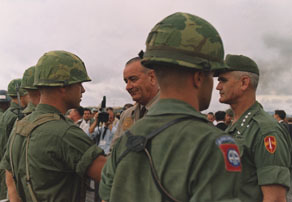Thomas E. Ricks's Blog, page 226
October 12, 2011
Everybody's busting in on blogging

Now the new CNO has one.
"Whoa, homeys, some mad crazy budget bullshit going on in the Tank with the
Chiefs today." I wish!
Commanders, want to learn 'shaping operations'? Try playing a video game

By Jim Gourley
Best Defense chief video
games reviewer
Tom Ricks recently
asked me if I would review a war-based strategy game for the blog. The game,
titled STAVKA-OKH, had a
unique concept with the potential to give military officers cause for
introspection. The player takes on the role of either Hitler's or Stalin's
chief of staff and influences the overall strategy of either side for the
duration of WWII. The concept was to inject a sense of self-interest in the
player beyond simply winning the war for their "team" and creating an
environment of internal political tension between their dictator and
subordinate staff. The player could only choose from war plans developed by the
staff, but was also made aware of the likelihood of the dictator either
actually endorsing the plan or overruling the decision. Based on these factors,
and the choice to "support the party" in its respective campaigns of
genocide, the player accumulated "glory points" that would influence
their army's success and their own reputation. Between the two sets of
conflicting values, one could either end the game as a victorious but unpopular
tactician or escape the war crimes tribunal in defeat.
While the concept
resonates strongly with the dynamics of military staffs throughout history, the
game itself falls flat in its execution. It lacks the sophistication to make it
either enjoyable or informative. The problem has nothing to do with graphics or
artificial intelligence. It's that STAVKA-OKH
is that it tries to do too much. The program acts as the enemy, the staff, the
dictator and the ultimate evaluator of the player's performance. What makes
modern games successful, and what researchers wondering what military-themed
games can tell them about actual military leadership and action, is just how
little they do. Today's most popular games, both among players and scientists
of various fields, simply provide a construct within which the players can
interact with others and the environment. The concept of "free play"
has advanced to the point that even the concept of "winning" is an
open-ended proposition. Notably, many games orchestrate their framework to
foment conflict between players, and a large portion are combat-themed. Within
this genre, lessons abound.
Most recognizable
is the ubiquitous "first-person-shooter," or FPS. I have already
lodged my formal complaints about such games and their effects on gamers of all
backgrounds on this blog. Meanwhile, the Army and Marines have developed
versions as training aids for combat troops (originally created as a recruiting
tool, "America's Army" game actually became a commercial success). However,
there are unique examples that demonstrate positive lessons in both the
official use and entertainment varieties. The salient feature of the games is
that, as violent as they are, the player is removed from any actual physical
threat. This has a profound influence on a player's tactical decision making. What
cover does a soldier/player take, what rate of fire do they select, and at what
range do they engage with the enemy when their avatar never fatigues, never
runs out of ammo, and simply "re-spawns" if killed? [[BREAK]]
DoD training aids
place more realistic constraints on a player to emphasize realistic decision
making, but what cannot be replicated is the individual player's fitness level
and tactical proficiency. The aim of a mouse-click rarely factors muscle
control, nor do computer avatars frequently collapse from dehydration. Understanding
what the individual fighter will do when unrestricted by their physicality may
yield insight on how to improve their conditioning.
Perhaps a darker
side to these games is the sense of accountability developed by players. When
relieved of adhering to rigid principles of conduct and given the singular
priority of "winning," players demonstrate an extraordinary level of
creative improvisation -- albeit in morally questionable ways. When observed in
the context of military weapons accountability protocols, one would be shocked
at just how quickly a game player will throw away their weapon in exchange for
that of a dead enemy in order to continue fighting. Depending on the game's
parameters, the matter of "collateral damage" might not factor at all
into a player's decision making. If there's no penalty for dispatching an
"innocent bystander," human shields are reduced to nuisances in the
player's calculus. There is also the matter of accountability within the unit. The
practice of fragging a member of one's own unit to prevent them from
compromising a group's mission is so well-known that the gaming community has
its own terminology for it -- "team killing." Interestingly, one persona is
equally feared and reviled by patrolling soldiers in both the real and digital
combat zones. Gamers refer to snipers in their hide sites as
"campers," and make special efforts to kill those players especially
quickly and brutally. Sometimes, the efforts go so far as to hack the game
program in order to "kick" the player from the server entirely.
It's the
"massively multiplayer" genre of games that provide the best
laboratory to study the dynamics STAVKA-OKH
initially proposed. The two games that have bared the most academic fruit to
date are the mega-popular World of
Warcraft and the lesser-known but perhaps more sophisticated EVE
Online. These games have no real end-state. Instead, they simply
provide a highly interactive environment in which players can live a virtual
life, selecting from a myriad of professions and pursuits. Each are based on a
conflict format, though. In World of
Warcraft, players are encouraged to join guilds, which act very much like
tribes, in order to seek protection and complete goals only achievable by large
groups. These roving bands go on set-piece raids, rescue missions, and even go
to war against each other based on group decision-making. Results vary, and the
impacts of individual idiosyncrasies immediately become evident. World of Warcraft has already shown 27 million people
what STAVKA-OKH is trying to
demonstrate -- and with real people, no less.
There have been
other profound events within the game that interested social scientists. Researchers
at MIT and Tufts University asked game developer Blizzard Entertainment for all
information related to a glitch
that produced an epidemic of "corrupted blood" in the game world.
Given that more people play WoW than
there are citizens of the state of Israel, it provided reams of information on
how epidemics could impact economies and societies.
More closely
related to military problems, though, is the case of how Blizzard dealt with a
heightening problem of violence in the game. While the game encourages rival
bands to bash each other to pieces in pitched battle, its success still relies
on players from all walks of life enjoying experiences outside of combat. However,
as more players signed up, the trend of countryside muggings increased
exponentially, reaching a particularly unsavory height with the slaughter of
participants in an in-game funeral procession for a fellow player who had
recently died in real life. That the deceased was a young girl caused
particular rage in the community, and there was an outcry for the offending
players to be banned. This put Blizzard in a bind to find a way to encourage
players to behave in a more ethical way without making them feel as though they
were being restricted in their choices.
Their solution was
to implement an "honor system" of scoring, whereby players would gain
or lose points based on the evenness of the duel. The idea was to discourage
more powerful players from preying on the weak. A player's honor score allows
them to qualify for certain weapons and equipment to improve their performance.
The implied consequence being that more ethical players become stronger, and
ostensibly more capable of dispatching malefactors. While it would be
impossible for the U.S. military to impose such a system for rewarding
individuals based on their decisions in Iraq or Afghanistan, the principle of
gamesmanship to influence behavior is worth further study to strategic planners
in a low-intensity conflict environment.
But with respect to
real-world parallels, WoW's
architecture pales in comparison to EVE
Online, a space-based game in which interstellar armadas battle for
conquest across the universe. The twist to the game is that these fleets serve
no emperor nor press for geographic control. Everyone works for an interstellar
conglomerate and the name of the game is economics. Negotiating a favorable
deal on the sale of a mineral-rich moon or the acquisition of a new merchant
vessel is just as important a skill as your aim with photon torpedoes. It's
become no trifling matter. The game's universe has a government -- the Council
of Stellar Management -- and each year since 2008 they've beamed down to
Reykjavik to discuss everything from exchange rates to crash issues with
Windows Vista.
The game's economy,
and how it foments armed conflict, shouldn't be taken for granted as a subject
of study. The developers themselves recently admitted they were in over their
heads and actually hired a professor of economics to help them understand what
was going on in their own game. In one of his first interviews
since taking the job, Dr. Eyjólfur Guðmundsson explained the EVE universe as
filled with resources and fraught with conflict, with multiple large powers
vying to collect them. It's possibly an analogy for Africa with the economics
of an arms race thrown in.
The key point for
researchers and military simulations specialists, though, is that all of the
aforementioned complexity came not as a result of ingenious programming or
oversight, but evolved in a truly organic way. Given that such primacy has been
placed on the "shaping operations" of counter-insurgency in modern
conflicts, we should reconsider how we approach the digital simulation
frontier. A game has extraordinary potential beyond a simple canned environment
for people to run around and shoot each other. It's a world for whom the
creator can be as involved, and as frustrated in their efforts to maintain
dominion over their fate, as any other player.
Viewing a military
commander as an environment developer, the perception gap between the battle
space and outer space suddenly closes, and one can appreciate the instructive
value of watching how gamers react to each other and the restrictions imposed
upon them by a higher authority. Games truly are no different than any other
society. Certain members will always find a way to defy what at first seem to
be ironclad edicts. It's also important to keep in mind that players of EVE and WoW come from almost every race, nationality, and age demographic. This
best represents the salient point for military and foreign policy researchers --
it's
not just kids' stuff anymore.
October 11, 2011
Today's list: The top ten reasons Gen. Westmoreland lost the war in Vietnam

By the way, here is the
first review I have seen of Sorley's new biography of Westmoreland, which I
read in galleys last summer, and enjoyed.
By Lewis Sorley
Best Defense Saigon bureau chief
10. He lacked the schooling and relevant experience to
understand the war and devise a viable approach to prosecuting it. He was an
artilleryman who missed out on the Army's great schools system, never attending
the Command & General Staff College or the Army War College. Overseas
during World War II he had limited line duty (16 months of battalion command,
then 13 months in staff positions) and of 14 months of command during the
Korean War and its immediate aftermath he spent eight months in reserve in
Japan and only six months in Korea, and that during the mostly static final
months of the war.
9. His senior staff lacked diversity of experience and
professional outlook, consisting mostly of people with backgrounds similar to
his own, especially airborne. Thus there was little internal capacity for
debating or evaluating his chosen course of action.
8. He was uninterested in other viewpoints on how the war
might be prosecuted, dismissing the PROVN Study sponsored by Army Chief of
Staff General Harold K. Johnson (which concluded that Westmoreland's way of war
was not working and could not work) and basic disagreements with
Westmoreland's organization and approach voiced by his brilliant classmate
General Bruce Palmer Jr.
7. He thought he could take over the war from the South
Vietnamese, bring it to a successful conclusion, and then hand their country
back to them and go home in triumph. He couldn't.
6. He deprived the South Vietnamese of modern weaponry,
giving U.S. and other allied forces priority for issue of the new M-16 rifle
and other advanced military wherewithal. The South Vietnamese thus went for
years equipped with castoff WWII-vintage U.S. equipment while outgunned by the
communists, who were armed with the AK-47 assault rifle and other top of the
line equipment.
5. He denied senior civilian officials accurate data on
enemy strength and composition, during development of a 1967 Special National
Intelligence Estimate imposing a ceiling on the number of enemy forces his
intelligence officers could report or agree to and personally removing from the
order of battle entire categories that had long been included, thus falsely
portraying progress in reducing enemy strength.
4. His war of attrition, search and destroy tactics, and
emphasis on body count did nothing to affect the war in the hamlets and
villages of South Vietnam, where the enemy's covert infrastructure was left
free to continue using coercion and terror to dominate the rural populace.
3. He underestimated the enemy's staying power, maintaining
that if he could inflict enough casualties the communists would lose heart and
cease their aggression against South Vietnam. Instead the enemy proved willing
to absorb horrifying losses and keep fighting. Thus the "progress" Westmoreland
claimed in racking up huge body counts did nothing to win the war. The enemy
simply kept sending more and more replacements to make up his losses.
Westmoreland was on a treadmill.
2. He overestimated the American people's patience and
tolerance of friendly losses. On a visit to Vietnam Senator Hollings from
Westmoreland's home state of South Carolina was told by Westmoreland: "We're
killing these people," the enemy, "at a ratio of 10 to 1." Said Hollings,
"Westy, the American people don't care about the ten. They care about the one."
Westmoreland didn't get it.
1. And the number one reason why Westmoreland lost the war
in Vietnam: With his unavailing
approach to conduct of the war he squandered four years of support by much of
the American people, the Congress, and even the media.
Lewis
Sorley's new book,
Westmoreland:
The General Who Lost Vietnam
, is being published today by Houghton
Mifflin Harcourt.
Why the U.S. can handle minor threats like terror better than Europeans can

Jakub
Grygiel is one of the more interesting strategic thinkers around. In the
new (Fall 2011) issue of Orbis he has a good piece that looks
at why certain decentralized parts of the Roman Empire were better able to
counter the barbarian invasions than were others.
The lesson of his inquiry:
The policy of
decentralizing security provision by, for instance, building greater
capabilities for local police forces, may be the most effective way of responding
to such a security environment. Signs already abound that this is exactly what
is already happening in the United States, a country that because of a deep
tradition of self-reliance and federalism may be well positioned to adapt to
the possibility of non-state, small, localized, threats. Other countries, in
particular in Europe, where the drive to build a centralized state that
arrogates to itself most aspects of social life has been historically longer
and more relentless, may face greater challenges.
Canadian defense analyst: Time to build a wall to keep out the American barbarians

J.L. Granatstein of
the Canadian Defence and Foreign Affairs
Institute writes
in the Ottawa Citizen that the
purpose of the wall is, "Not to keep our 'terrorists' out of the
Republic, but instead to keep the Americans and their dysfunctional
governmental ideas, their wild-eyed politicians, their preachers, and their
rabid Fox commentators out of Canada."
October 10, 2011
Bacevich and some friends: Time for a commission to assess the post-9/11 wars

Andrew Bacevich, one of the more
interesting thinkers around, has a good piece
with some other cats proposing a independent, non-partisan commission "to evaluate
the military experience of the past decade." They call for an examination of
five particular aspects: The design of U.S. combat forces, the U. S. global
military footprint, the national security apparatus, the civil-military gap and
how top jobs have been filled.
This strikes me as a worthwhile
proposal.
Meanwhile, I finally caught up
with Professor Bacevich's essay
on Albert Wohlstetter, which contains this memorable two-cushion shot in
reference to the revolution in military affairs, or RMA:
Joint Vision 2010 stands in relation to the RMA as Tom Friedman's The
Lexus and the Olive Tree stands in relation to globalization: it is an
infomercial-marketing disguised as elucidation.
A landmark for Tom: For the first time in 3 years, the work bookshelf is empty

Last Friday at 5:15 pm, something happened to
me for the first time in three years: I turned and saw I had no more books or
documents I needed to read or review for the book I am writing, a history of
American generalship since 1939.
It was kind of stunning. For years, every time
I finished a book or paper or oral history interview or article, I would have
another one lined up in the small bookshelf I use as my "on deck circle" for
work reading. On Friday, I finished looking over a new book on Iraq, and then
saw there was nothing left. I actually am waiting on a few books I ordered, as
well as some material from my researcher, but at the moment, nothing awaits -- no
more biographies of obscure World War II generals, no more vacuous memoirs by
Gen. Mark W. Clark, no more revisionist histories of the Vietnam War, no more
bizarrely boring oral history interviews with properly forgotten generals -- "and
then I was assigned to the 352nd Crossword Puzzle Company, down in
Fort Hooha, it was a corps slice where I was XO to old Johnny Smith, well he
was a character, one time we drank a whole six pack and went fishing..."
So I picked up Richard Rumelt's book on Good
Strategy/Bad Strategy, which I've wanted to get to, but which was not
on my list of military history readings.
PS -- Not to panic. On Saturday morning, a
400-page manuscript arrived from a friend needing a blurb. And then the mail
brought a new book about the war in Iraq. Back 2 work 4 me.
Annals of bad ideas: Bringing weapons home from A'stan and Iraq to peddle

Petty Officer Nicholas Bickle, a Navy SEAL, tried
it with dozens of weapons, plus
some explosives. Now he's looking at many, many years behind bars, plus a big
fine. Celebrity footnote: He once appeared in a "Transformers" movie.
October 7, 2011
D'Este's list of ten books about World War II that deserve to be better known

To top off our all-book Friday file,
it's an honor to present a book list from Carlo
D'Este, one of my favorite historians. Here he offers up a list of books
about World War II that he thinks should be better known.
Carlo adds in a note, "A couple of them (Eisenhower and
Toland) were quite well-known when published but with the passage of time may
be somewhat forgotten but were nevertheless added to the list. It is highly
subjective: there are literally hundreds of fine books that could have been
added; these are merely ten that came immediately to mind and are very worthy."
Later this month D'Este will pick up
a big fat prize for lifetime achievement from the Pritzker
Military Library in Chicago.
Dominick Graham and Shelford Bidwell, Tug
of War: The Battle for Italy, 1943-45
John S.D. Eisenhower, The Bitter Woods: The Battle of the
Bulge
Lt. Gen. Lucian K. Truscott, Command Missions: A
Personal Story
Frederick
C Sherman, Combat Command: The American Aircraft Carriers in World War
II
Gerald
R. Pawle, The War and Colonel Warden (about Churchill)
David
Fraser, Alanbrooke
R.W.
Thompson, The Battle of the Rhineland
Way
of a Fighter, The memoirs of Claire Lee Chennault
J.D.
Morelock, Generals of the Ardennes: American Leadership in the Battle
of the Bulge
John
Toland, The Last 100 Days
'The Generals' War': A good history of the '91 Gulf War, revisited 16 years later

I recently re-read The
Generals' War, a history of the 1991 Gulf War by Michael Gordon and
Bernard Trainor. I thought it was a good book when I read it the first time,
when it was published 16 years ago, but now I think it is even better. I would
say, just terrific.
Their analyses have
been borne out by time, especially of the failings of General Norman
Schwarzkopf -- that his planning lacked imagination, that he didn't appreciate
the political implications of the Scud attacks on Israel (and so failed to
consider in his planning whether to insert Special Operators to go after Scuds
in western Iraq), that he and General Powell didn't grasp the implications of
the Khafji battle (which the authors say showed that Iraqi ground forces could
be damaged considerably by air attacks), and so devised a war plan that
backfired. Schwarzkopf wanted to use a Marine attack from the south to fix the
Iraqis in Kuwait so they could be destroyed by Army forces attacking from the
west. Instead, the Iraqi forces were so weakened by air attacks and desertion
that the Marines pushed the Iraqis out, like a cork popping out of a bottle,
and the Army arrived on the scene too late.
In a foreshadowing
of the Iraq war in 2003, Schwarzkopf apparently gave no thought to the day
after the war ended.
Sidenotes: I hadn't
realized how much I had forgotten about the '91 war. Also, an odd sensation to
be making a transition in the book I am writing from history I didn't
experience (World War II, Korea, Vietnam) to history I did.
Thomas E. Ricks's Blog
- Thomas E. Ricks's profile
- 436 followers



